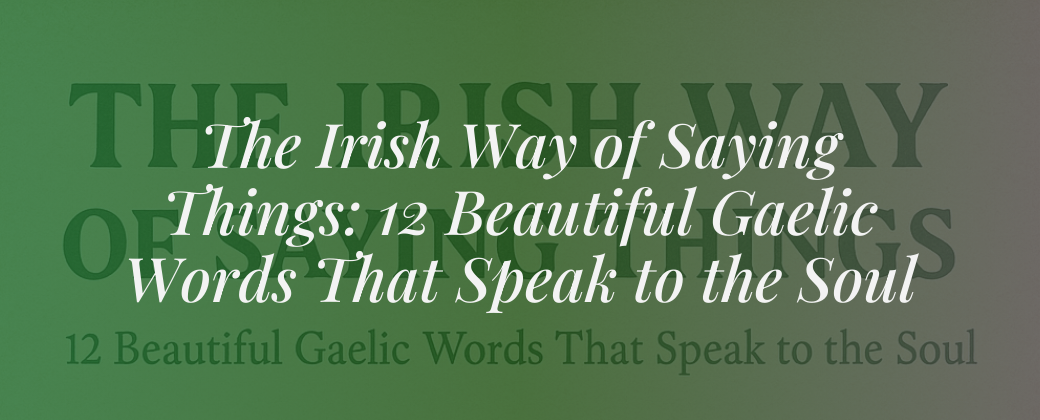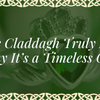The Irish Way of Saying Things: 12 Beautiful Gaelic Words That Speak to the Soul

🌿 Why the Irish Language Feels Like a Hug for the Soul
Unlike English, which can be quite direct, Irish tends to wrap its meanings in metaphor and melody. It doesn’t just say what something is—it expresses what it feels like. That’s why even a simple phrase can carry generations of heartache, hope, or humor.
Let’s explore 12 of the most poetic Gaelic words that capture the spirit of Ireland—its land, people, and the unspoken connection between them.
🍀 1. Grá (graw) – Love
This short, soft word means love, but in Irish, it feels like more than just romance. It’s also the love for family, land, stories, and memory. Grá carries weight—a deep, lifelong kind of affection.
“Is tú mo ghrá” — You are my love.

🍃 2. Dúchas (doo-khass) – Heritage / Inborn Connection
Dúchas speaks to something deep inside you—your roots, your origin, your instinct. It’s the feeling of belonging somewhere even if you’ve never lived there.
It’s not just where you’re from. It’s what’s in your bones.
🌫 3. Ceol (kyol) – Music
In Irish, ceol doesn’t just mean music—it evokes a sense of something flowing and alive. Traditional Irish ceol tells stories through fiddle, flute, and voice that can pierce straight through the heart.
“Ceol na nGael” — Music of the Gaels.

🌀 4. Féile (fay-leh) – Festival / Generosity of Spirit
A word that doubles in meaning—Féile refers to a festival, yes, but also to warmth, hospitality, and joyful community. It’s the kind of energy you feel during St. Patrick’s Day or a village ceilí.
🌾 5. Solas (suh-luss) – Light / Illumination
Not just physical light—solas represents hope, wisdom, and the glow that comes from within. It’s the kind of word you might inscribe on a pendant to remind someone of their inner strength.

🌊 6. Suaimhneas (soo-iv-ness) – Peace / Serenity
This word evokes deep, emotional peace—not just quiet, but the feeling of everything being okay, even if just for a moment.
Think of a quiet walk by the sea, or that first sip of tea on a rainy day.

🌧 7. Fáilte (fall-cha) – Welcome
A word every visitor to Ireland sees on signs and hearts alike. It’s more than “hello.” It means you’re home now, you’re safe, and you belong.
🔥 8. Croí (kree) – Heart
Pronounced like “cree,” this is the center of all emotion, intuition, and life in Irish thought. The croí isn’t just where love lives—it’s where courage does too.
🍂 9. Seanchas (shan-kass) – Lore / Oral Tradition
Seanchas refers to ancient stories, passed down by word of mouth. It's the soul of Irish heritage and the heartbeat of its culture.

🌌 10. Misneach (mish-nakh) – Courage / Spirit
A word for bravery, but not just of the battlefield kind—this is quiet courage. The kind that gets you through grief, change, or uncertain times.
🌺 11. Aoibhneas (eev-nyass) – Delight / Bliss
The kind of joy that bubbles up from inside—a beautiful sky, a shared laugh, a warm loaf of bread. It’s simple, soft happiness.
🌙 12. Gealach (gyal-akh) – Moon
The moon in Irish culture is mystical, feminine, and wise. Gealach holds the essence of cycles, softness, and quiet power.
💚 Wrapping It All Up: Irish Isn’t Just Spoken—It’s Felt
There’s something magical about how the Irish language captures human feeling. These words don’t just describe things—they embrace them. Whether you’re learning Gaeilge, connecting with your roots, or simply looking for words that feel like poetry, let these 12 treasures stay close to your croí.
You might even find a word that speaks to you so deeply, you’ll want to carry it with you on a pendant, a ring, or even inked on your skin.
☘️ FAQs
Q: Can I get these words engraved on jewelry?
A: Absolutely. Words like "Grá", "Croí", or "Solas" are popular for personalization. They’re meaningful, elegant, and make beautiful gifts.
Q: How do I learn more Irish Gaelic?
A: Check out free resources like Duolingo Irish, or dive into community classes from groups like Conradh na Gaeilge.
Q: Are these words still used in daily Irish life?
A: Many of them are! Especially in Gaeltacht (Irish-speaking) regions and in literature, music, and cultural expression.





